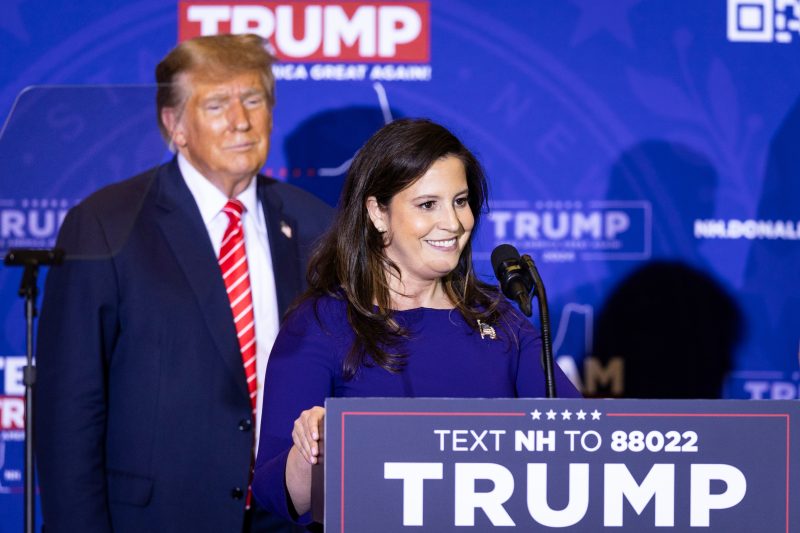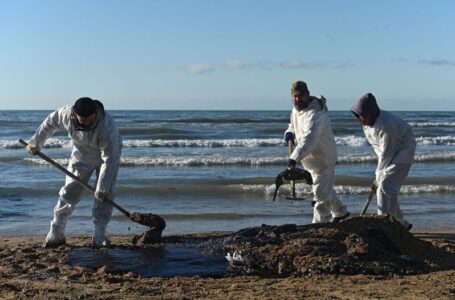Thousands of liters of chemicals dumped into Brazilian river during deadly bridge collapse
Stefanik makes sure Trump knows she wouldn’t be a Pence


Rep. Elise Stefanik (R-N.Y.) did something unusual in the hours after rioters overran the Capitol on Jan. 6, 2021. Like most of her Republican colleagues, she went ahead and tried to block electors submitted by states that Joe Biden won, the formal manifestation of the rioters’ intentions. But, unlike most of her colleagues, she only objected to one set of objectors: those from Pennsylvania, not Arizona.
In her speech from the House floor that evening, Stefanik seemed to offer a reason: She recognized questions about the former.
“Tens of millions of Americans are concerned that the 2020 election featured unconstitutional overreach by unelected state officials and judges ignoring state election laws,” Stefanik claimed. “We can and we should peacefully and respectfully discuss these concerns.”
For example, she continued: “In Pennsylvania, the State Supreme Court and Secretary of State unilaterally and unconstitutionally rewrote election law eliminating signature matching requirements.”
She also mentioned purported issues in Georgia, Michigan and Wisconsin, states whose objectors she’d also expressed a willingness to oppose. The riot upended those plans. Objections needed both a representative and a senator to move forward and, after the day’s violence, most senators balked. But Sen. Josh Hawley (R-Mo.), who had been one of the first on the Senate side to announce his intent to block a submitted slate, wasn’t deterred. So at about 3 in the morning of Jan. 7, 2021, Stefanik had the chance to vote against recognizing Pennsylvania’s electors.
In an interview on CNN on Thursday evening, though, Stefanik suggested that she wished she could have done more.
Host Kaitlan Collins asked Stefanik what she would have done on Jan. 6 had she been vice president.
“I would not have done what Mike Pence did. I don’t think that was the right approach,” Stefanik replied — referring to Pence’s acceptance that his role was simply to manage the process of counting votes. “I specifically stand by what I said on the House floor,” Stefanik continued. “And I stand by my statement, which was there was unconstitutional overreach.”
Collins pressed her, but Stefanik simply reiterated the same point.
“There was unconstitutional overreach in states like Pennsylvania,” Stefanik said. “And I think it’s very important that we continue to stand up for the Constitution and have legal and secure elections, which we did not have in 2020. And tens of millions of Americans agree with me, Kaitlan.”
It is interesting that Stefanik so assiduously stands by the comments she offered on the floor of the House that evening, given that they were recently removed from her official website. (This apparently followed former Wyoming Rep. Liz Cheney’s praise for the statement, given that it referred to the violence as “anti-American” and called for those involved to be “prosecuted to the fullest extent of the law.”) It is also interesting because her arguments in support of rejecting electors, dubious at the time, have only grown more obviously contrived.
Consider the Pennsylvania argument. Unlike other allies of Donald Trump, Stefanik focuses not on changes to election law in the Keystone State (that were made by the Republican legislature in 2019) but, instead, on the idea that rules about signature matching on absentee ballots were loosened. The argument she offered on Jan. 6, though, is inherently contradictory: The state Supreme Court “unilaterally and unconstitutionally rewrote election law?” It is true that, in October 2020, the state Supreme Court allowed the change. But the arbiter of adherence to Pennsylvania’s constitution is the state Supreme Court, not a legislator from New York!
Her arguments about the other suspect states was similarly thin, even then. She mentioned affidavits in Michigan that didn’t demonstrate fraud, a change to rules in Georgia that had already been adjudicated in federal court and a change in Wisconsin that ended up being of more benefit to people in counties that voted for Trump. All of this was known publicly before Jan. 6, 2021.
So why does Stefanik stand by these claims, using them to suggest that Pence somehow did the wrong thing? Pretty clearly for the reason that Collins mentioned when asking the question in the first place.
“Let’s talk about the vice presidency,” Collins said, noting that Stefanik “said that you would be willing to serve in a Trump administration.” In fact, Stefanik is often mentioned as a possible (if not likely) vice-presidential pick from Trump should he win the Republican nomination (as he probably will).
Being Trump’s vice-presidential pick, though, requires two things. First, credibility with Trump’s base, meaning that past statements like that the Jan. 6 rioters deserved prosecution should probably be deep-sixed. Second, demonstrated loyalty to Trump. For more than four years, Mike Pence did a good job on that front, manifesting a loyalty that would inspire admiration from a Golden Retriever. But then, in early January 2021, he threw it out the window in favor of the Constitution and the republic.
Stefanik’s not about to cop to doing something that foolhardy.
You can tell from Stefanik’s rhetoric during that Jan. 6 speech that she’s making a political calculation. She doesn’t say that Trump’s furious base was incensed about false claims of election fraud, which they were. She claims, instead, that the base was mad about “unconstitutional overreach by unelected state officials and judges ignoring state election laws” — the line of argument that was developed by Republican officials and pundits eager not to displease Trump’s voters but unwilling to simply reiterate obvious nonsense about fraud. And you can tell from her split vote on Arizona and Pennsylvania: the former she couldn’t really defend to her erudite peers; the latter she could.
If Trump didn’t see the CNN interview in real-time, we might assume that someone — perhaps someone supportive of Stefanik — will make sure that he does.











